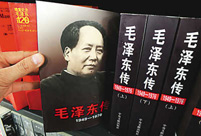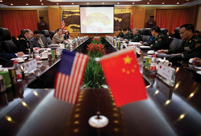 'Jin' named the word of the year by cross-strait netizens
'Jin' named the word of the year by cross-strait netizens Chinese scientific expedition goes to build new Antarctica station
Chinese scientific expedition goes to build new Antarctica station
 Chinese naval escort fleet conducts replenishment in Indian Ocean
Chinese naval escort fleet conducts replenishment in Indian Ocean 17th joint patrol of Mekong River to start
17th joint patrol of Mekong River to start China's moon rover, lander photograph each other
China's moon rover, lander photograph each other Teaming up against polluters
Teaming up against polluters
In the eyes of many people, they represent the image of China, but in their own eyes, they are the few who have to tackle the tough queries raised by journalists from around the world every day.
A reception, in the name of celebrating the upcoming year, was held by the Ministry of Foreign Affairs at Beijing's Dadu Museum of Art in early December, attracting diplomats, government officials, as well as dozens of journalists from home and abroad.
Unlike previous years, each attendee was told to participate in the annual event for another reason, to mark the 30th anniversary of the establishment of the foreign ministry spokesperson mechanism in China.
As an important channel for releasing information and a window for the outside world to understand China, the foreign ministry spokesperson mechanism was officially established three decades ago, only five years after the nation decided to adopt reform and opening-up.
Pictures of 27 spokespersons were presented on one side of the conference hall, representing the history of the system.
The portraits ranged from Qian Qichen, who acted as the first in 1982, to the present's Qin Gang, Hong Lei and Hua Chunying.
In his speech, Minister of Foreign Affairs Wang Yi compared China's spokesperson mechanism with the lifespan of a person, who is mature at the age of 30, according to the philosophy of Confucius.
Important channel
Hailing it an important channel for the world to understand China, Jia Qingguo, a vice-director of Peking University School of International Studies, told the Global Times, "Transparency and timely interpretation of policies are the trend in China's diplomacy."
Su Jingxiang, a research fellow with the China Institutes of Contemporary International Relations, told the Global Times that all the spokespersons, who represent the authority and attitude of the Chinese government, are well-trained.
"The spokesperson mechanism contributes greatly to the openness of the government," said Su.
Spokespersons may change their language style and use different techniques when facing sensitive topics.
Qin Gang, the present spokesperson, was once faced with criticism of the opacity in Chinese military expenditure. Instead of giving a direct response to this question, he asked the journalist a question in response.
According to studies carried out by Zhou Qing'an, an associate professor with the School of Journalism and Communication at Tsinghua University, when reporting international affairs, especially involving China, the quotation rate of Chinese spokespersons by the foreign media has grown, responding to the increasing role China's voice in the international arena.
Lars Moberg from Swedish Television told the Global Times that the spokespersons for the foreign ministry were very open-minded and reporters could ask any questions they want during the conferences.
Ian Johnson from The New York Times echoed that it is of great importance to have the spokesperson system so China's voice can be received by the world.

 Commemorate 120th birth anniversary of Mao Zedong
Commemorate 120th birth anniversary of Mao Zedong Female soldiers of PLA Marine Corps in training
Female soldiers of PLA Marine Corps in training Chinese cities to have a very grey Christmas as smog persists
Chinese cities to have a very grey Christmas as smog persists China and U.S. - the national image in each other’s eyes
China and U.S. - the national image in each other’s eyes The Liaoning's combat capability tested in sea trial
The Liaoning's combat capability tested in sea trial Chinese pole dancing team show their moves in snow
Chinese pole dancing team show their moves in snow Rime scenery in Mount Huangshan
Rime scenery in Mount Huangshan Ronnie O'Sullivan: My children mean the world to me
Ronnie O'Sullivan: My children mean the world to me Shopping in Hong Kong: a different picture
Shopping in Hong Kong: a different picture Yearender: Animals' life in 2013
Yearender: Animals' life in 2013 Hello 2014 - Chinese greet the New Year
Hello 2014 - Chinese greet the New Year Chocolate 'Terracotta Warriors' appear
Chocolate 'Terracotta Warriors' appear  Top 10 domestic news of 2013
Top 10 domestic news of 2013 Red crabs begin annual migrations in Australia
Red crabs begin annual migrations in Australia Artifacts retrieved from West Zhou Dynasty
Artifacts retrieved from West Zhou DynastyDay|Week|Month